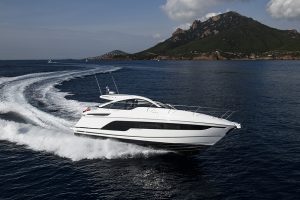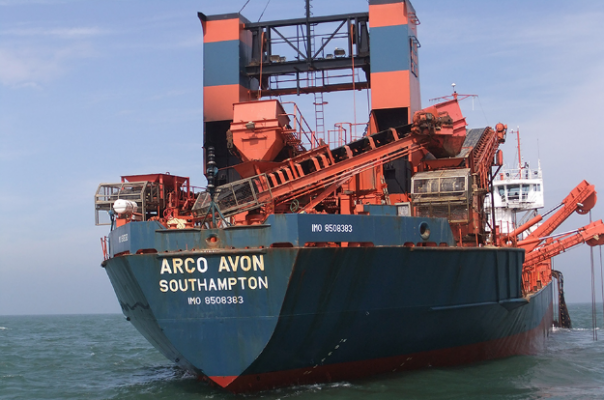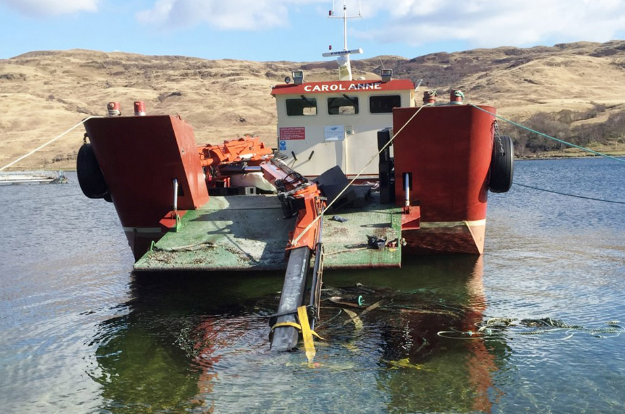Death of Arco Avon engineer highlights safety lapse
A report by the Marine Accident Investigation Branch reveals a lapse of safe systems of work on board the Arco Avon led to the death of an engineer.
Engineer Anthony Jones died after he was badly burnt in a fire which broke out in the engine room of the dredger, Arco Avon.
The third engineer, who had served for 26 years in the Royal Navy, was attempting to repair a failed fuel pipe when fuel, under pressure in the pipe, ignited.
The incident took place at 2312 on 18 August 2015, while the vessel was loading sand cargo around 12 miles off Great Yarmouth.
The Arco Avon is owned by Hanson Aggregates Marine Limited (HAML).
An investigation by the Marine Accident Investigation Branch (MAIB) has found policies and procedures designed to mitigate risks were not followed on board.
Recognised safe systems of work on the Arco Avon were also allowed to lapse.
The MAIB report stated that:
• No one else on board was aware of a failed fuel pipe or that the third engineer had apparently decided to repair it.
• The third engineer was using a portable angle grinder to access the repair site, and had underestimated the risk of doing so.
• Possible contributing factors to the third engineer’s underestimation of risk were that he had neither carried out a formal risk assessment nor sought a permit to work prior to commencing the repair.
“By acting alone, without any other members of the crew being aware of his intentions, the third engineer compromised both his own and the rest of the crew’s safety,” concluded investigators.
The MAIB found there was an “onboard culture” on the Arco Avon “of routine lone working and absence of regular and frequent communication.”
Investigators also revealed that the first-aid treatment given to Jones was “rudimentary”.
“Although visited by several members of the crew, including the master, his (Jones) medical care was left solely to the cook and this was limited to the provision of liquid refreshment in the form of fruit squash,” noted the MAIB.
“It was not until an RNLI paramedic (from Gorleston RNLI) arrived that care, commensurate with the extent of his injuries, was instigated”.
Although Jones was airlifted by helicopter to the Norfolk and Norwich University Hospital he died later that day
The MAIB did highlight that the severity of Jones’ injuries “was such that any action by the crew was unlikely to have saved the third engineer.”
The report also revealed concerns about personal protection equipment (PPE).
It found that both the cotton and polyester/cotton coveralls available to Jones “do not offer suitable protection against ignition and flame spread.”
The MAIB also highlighted concerns about the Merchant Shipping Notice (MSN) recommendation on PPE for work in engine rooms.
“The fact that coveralls of ‘high cotton content’ were listed in MSN 1731 (M+F) as suitable for use in engine rooms as a protection against fire is a significant concern,” stated the MAIB.
“This might have led to an unfounded confidence that a cotton garment would provide a recognised level of fire protection,” it noted.
The MAIB has made a number of recommendations to the Maritime and Coastguard Agency.
These include:
- Reviewing The Code of Safe Working Practices for Merchant Seafarers to address the hot work hazard of sparks generated by the use of fixed and portable angle grinders.
- Merchant Shipping Notice 1870 (M+F) to introduce an appropriate standard for overalls for work in engine rooms or other area where there is a risk of fire.
- The Ship Captain’s Medical Guide to provide clear guidance on the appropriate medical treatment for serious burns.
Hanson Aggregates Marine Limited has been recommended to review and, “as appropriate, amend its safety management system to ensure, inter alia, that manning levels, watchkeeping duties and communication procedures provide for safe engine room operations at all times”.
Commenting on the report, the Chief Inspector of Marine Accidents, Steve Clinch, said: “The sad death of an experienced officer serving on a UK registered ship serves as a salient reminder of the risks that crews can be exposed to when policies and procedures designed to mitigate such risks are not followed, and recognised safe systems of work are allowed to lapse.”
“Robust risk assessments and safe systems of work are important barriers that prevent marine accidents,” he continued.
“Everyone, from the individual seafarer to the senior company executive ashore, needs to develop shared company safety cultures that make the use of risk assessments and safe systems of work an unquestioned part of life when working on board UK registered vessels,” concluded the Chief Inspector.
MAIB: boaters should fit carbon monoxide alarms
The Marine Accident Investigation Branch has issued a stark warning to boaters following the deaths of two people on board…
MAIB: Death of skipper of the Carol Anne was avoidable
Jamie Kerr, 25, died on the Carol Anne when the crane fitted to the workboat collapsed. The MAIB has now…
MAIB: Poorly discarded cigarette “probable” cause of trawler fire
The Marine Accident Investigation Branch (MAIB) has now released its report into the fire and sinking of the prawn trawler,…












